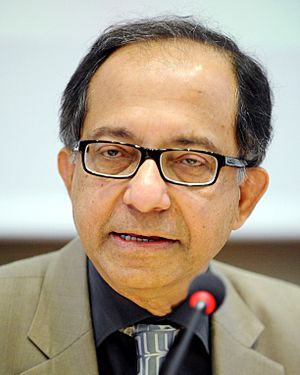Kaushik Basu facts for kids
Quick facts for kids
Kaushik Basu
|
|
|---|---|
|
কৌশিক বসু
|
|

Basu in Festival Economia 2013
|
|
| 11th Chief Economist of the World Bank | |
| In office October 2012 – October 2016 |
|
| President | Jim Yong Kim |
| Preceded by | Martin Ravallion (Acting) |
| Succeeded by | Paul Romer |
| 14th Chief Economic Advisor to the Government of India | |
| In office 2009–2012 |
|
| Prime Minister | Manmohan Singh |
| Preceded by | Arvind Virmani |
| Succeeded by | Raghuram Rajan |
| Personal details | |
| Born | 9 January 1952 Kolkata, West Bengal, India |
| Spouse | Alaka Malwade |
| Education | University of Delhi (BA) London School of Economics (MSc, PhD) |
| Academic career | |
| Field | Macroeconomics |
| Awards | Padma Bhushan (2008) Humboldt Prize (2021) |
| Information at IDEAS / RePEc | |
Kaushik Basu, born on January 9, 1952, is a famous Indian economist. He held important jobs like being the Chief Economist for the World Bank from 2012 to 2016. Before that, he was the Chief Economic Adviser to the Government of India from 2009 to 2012.
He is currently a professor of economics at Cornell University in the United States. He also served as the President of the International Economic Association for three years, starting in June 2017. In 2021, he received the Humboldt Research Award for his work.
Contents
Early Life and Education
Kaushik Basu was born in Kolkata, India. He went to St. Xavier's Collegiate School there. When he finished school in 1969, his father wanted him to study physics. However, Kaushik was interested in other things. They decided on economics as a good middle ground.
In 1969, he moved to Delhi to study economics at St. Stephen's College. He then went to the London School of Economics (LSE). He earned his master's degree in economics from the University of London in 1974.
After his master's, he was supposed to study law. But he loved logic and the ideas of economist Amartya Sen. So, he stayed at the London School of Economics. He completed his PhD there from 1974 to 1976, with Amartya Sen as his guide.
Mr. Basu has also received several honorary doctorates. These are special degrees given to people for their achievements. He received them from universities in India, the US, and the UK.
As a child, Basu enjoyed Euclidean geometry. Later, as Chief Economist of the World Bank, he published a new way to prove the Pythagorean theorem. This proof used a special property of isosceles triangles.
Career Highlights
Kaushik Basu has taught at many famous universities. These include the Massachusetts Institute of Technology (MIT) and Harvard University. He also visited the Institute for Advanced Study in Princeton, New Jersey.
He was the Chief Economic Adviser to India's Ministry of Finance. This was while he was on leave from Cornell University. At Cornell, he is a Professor of Economics.
Basu is known for his work in several areas of economics. These include development economics and game theory. He also studied the economics of child labour. He even created a famous puzzle called the "traveller's dilemma."
In 1992, he started the Centre for Development Economics. This center is part of the Delhi School of Economics. He was its first leader until 1996.
Mr. Basu writes columns for news outlets like BBC News Online. He has also written several books about economics. One of his books is Beyond the Invisible Hand. He also edited the Oxford Companion to Economics in India.
On September 5, 2012, he became the Chief Economist at the World Bank. He also taught game theory at George Washington University. He writes monthly articles for Project Syndicate.
He has been a judge for the Social Sciences category of the Infosys Prize. He served as the head judge from 2012.
Today, Basu teaches at Cornell University. He works in both the Department of Economics and the SC Johnson College of Business.
Economic Ideas
Basu has written about Adam Smith's idea of the "invisible hand." This idea suggests that when people act in their own interest, it can help the economy work well. However, Basu believes that good qualities like honesty and fairness are also very important. He thinks these qualities help the "invisible hand" work effectively.
He also believes that governments and public discussions need better thinking. Basu has discussed Karl Marx's idea of a society where everyone gets what they need. He argues that the goal is good, but the way to get there needs a scientific plan. He feels that without a good plan, attempts to create an ideal society can go wrong.
Basu has also thought about our shared moral duties. He explores how individuals play a part in fulfilling these duties.
Views on Bribery
Kaushik Basu has a unique idea about certain types of bribes. He calls them "harassment bribes." These are bribes given to get something you are legally allowed to have, like a passport. He suggests that in these cases, only the person who takes the bribe should be breaking the law. The person who gives the bribe should not be punished.
His idea is that if only the bribe-taker is punished, the person giving the bribe would be more willing to help catch the person taking it. This idea has led to a lot of discussion.
Personal Life
Kaushik Basu is married to Alaka Malwade Basu. They have two children.
Awards and Honours
- Padma Bhushan, Government of India, 2008
- Doctorate of Humane Letters, Fordham University, 2013
- Alexander von Humboldt Foundation Research Award, 2021
 | May Edward Chinn |
 | Rebecca Cole |
 | Alexa Canady |
 | Dorothy Lavinia Brown |

